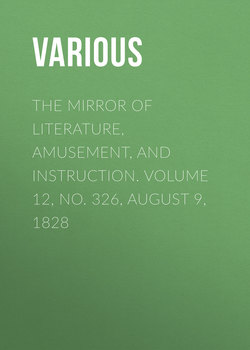Читать книгу The Mirror of Literature, Amusement, and Instruction. Volume 12, No. 326, August 9, 1828 - Various - Страница 8
THE CONTEMPORARY TRAVELLER
ОглавлениеACCOUNT OF THE VOLCANIC FORMATIONS NEAR THE RHINE
(From a Correspondent.)
There is a volcanic country on the left bank between Remagen and Andernach, highly interesting to the naturalist, but I believe not visited by the generality of travellers. The late accounts, however, of the formations of a similar kind in Auvergne and Clermont, in the centre of France, and the speculations to which these phenomena have given rise, determined me to explore this district whilst I was in the neighbourhood. Bidding adieu, therefore, to the green little island of Nonnenworth, I made the journey to Brohl, a convenient day's walk of sixteen miles, passing through Oberwinter, Remagen, and Breysig, and the other white and slated villages that enliven the river. It is here the valley of the Rhine narrows, and the succession of ridges and dales which the road skirts, are sometimes entirely barren, at others thickly covered with vines and fruit-trees. Though the former plant is pleasing in the tints of its leaf, and in the idea of cultivation and plenty that its thick plantations present, yet there is a stiffness in the regularity in which it grows, propped up by sticks; and it is so short, that one's fancy as to its luxuriance, (especially if formed from such poetry as Childe Harold,) is certainly disappointed. I made a digression from the road up the little river Aar, which falls into the Rhine near Sinzig. A more striking picture you cannot imagine. The stream is remarkably clear and rapid, the bottom rocky, and its banks, for a considerable distance, are literally perpendicular rocks. The Aar is a perfect specimen of the mountain torrent; it rises in the Eiffel mountains; and, I am told, in the winter does much mischief by inundations. It put me in mind of the Welsh rivulets, particularly some parts of the Dee. This détour having taken up more time than I expected, I reached Brohl, late, but in time for the supper at the rustic Gasthoff, which, with a flask of Rhenish wine, and the company of an agreeable German tourist who was staying there, made ample amends for the fatigues of the day.
In setting out from Brohl by the stream of the same name, which runs down from the Lake of Laach, where I was struck with the pieces of pumice-stone, and the charred remains of herbs and stalks of trees scattered over the marshes. I soon came to the valley, the sides of which are composed of what is called, in the language of geology, tufa, and in that of the country, dukstein, or trass. It is a stone, or a hard clay, of a dull blueish colour, and when dry, it assumes a shade of light gray. An immense quantity is quarried throughout the valley, and is sent down the Rhine to Holland, where it is in great request for building. The village of Nippes owes its origin to the trade in trass, having been founded by a Dutchman, who settled there about a century ago for the convenience of exportation. The lower part of the mass is the hardest and most compact, and is therefore preferred by the quarrymen; as it rises, the upper part becomes loose and sandy, and unfit for use. You must not suppose the stream to be clear like the Aar, for it is as thick as pea-soup, and about the same colour, being in fact a river of trass in solution. The banks, however, are picturesque and well wooded, particularly at Schweppenbourg, an old castle of peculiar architecture, built on an elevated rock, and formerly belonging to the family of Metternich, (God save the mark!) The tower is surrounded with caverns and halls, hollowed out of the trass stone, and profusely ornamented with fine oaks, pines, and spreading beech trees. You may almost fancy yourself on magic ground, and looking on a fairy castle, so peculiar is the effect. I next reached Burgbrohl and Wassenach, passing several of the trass mills, for the stone is in many places hard enough for mill-stones, and there is a considerable trade in them to Holland, and thence to England and other countries. Half an hour next brought me to the summit of the Feitsberg, one of the hills forming the circumference of the lake; here I enjoyed a magnificent prospect on the one side of the lake, well clothed with wood, with the old six-towered abbey on its bank, and the heights of the Eiffel chain enclosing it; on the other side, the view was so extensive as to give me a glimpse of Ehrenbreitstein, and of the line of hills from thence to the Siebengebrige. Though my object in climbing the Feitsberg was very different, my surprise and delight in unexpectedly catching Ehrenbreitstein at the distance of twenty-four miles even served to withdraw my attention some time from geologizing, or from the scene close under me. I recollect the same sensation on descrying Gravelines sometime ago from the heights of Dover Castle, not believing the distance to be within the powers of the telescope. True indeed is it that
